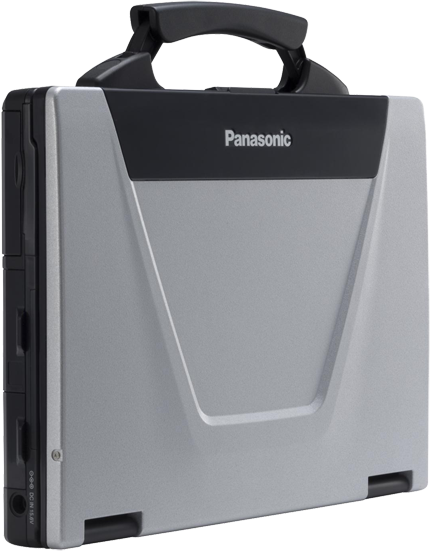Same HD, New PC
Serge Y. Stroobandt
Copyright 2014–2018, licensed under Creative Commons BY-NC-SA
Introduction
Someone in my family breaks, on average, a new consumer notebook computer every 18 months…

- Left desperate, I bought her a late 2007, second-hand, semi-rugged Panasonic Toughbook™ CF-52 Mk1. This ageless, MIL-STD-810F standard notebook features an Intel® Core™2 Duo Processor T7100 —2MB cache, 1.80GHz clock speed, 800MHz FSB—, 2048MB 667MHz-clocked DDR2 RAM, Intel® GMA X3100 graphics and of course a carrying handle. It weighs in at 3.45kg without counting its sizeable 0.82kg, 8A, 15.6V power “brick”. Not that this computer consumes a lot of power; the high current rating is for charging its massive 86.6Wh battery which delvers over 8 hours of autonomy.
Enough bragging… The Toughbook™ was given a thorough cleaning after removing the Windows™ XP stickers. Its hard disk was replaced with the one of the broken notebook which already ran Xubuntu 12.04 LTS. The CF-52 booted without any problem. Admittedly, I still had GRUB_CMDLINE_LINUX_DEFAULT="quiet splash acpi_osi=Linux" in /etc/default/grub, which dates back to the broken notebook. The WLAN adapter got up and running without any hocus pocus.
Nonetheless, whenever pulling a hard disk from one computer and putting it into another one, a few configuration changes may be deemed necessary. These are listed below.
Keyboard layout
The new system may have a different keyboard layout. Changing the keyboard layout in the desktop manager is all too easy. However, in adverse times, it is good to have the keyboard layout of the [Ctrl]+[Alt]+[F1]…[F6] consoles configured correctly in advance. Here is how that is done.
Hostname
If you are like me, naming your computers after their CPU or model name, you will need to change the hostname of the sytem. On Debian-based systems, two /etc files require editing:
Public SSH key
Sensors
lm-sensors

This work is licensed under a Creative Commons Attribution‑NonCommercial‑ShareAlike 4.0 International License.
Other licensing available on request.

Unless otherwise stated, all originally authored software on this site is licensed under the terms of GNU GPL version 3.
This static web site has no backend database.
Hence, no personal data is collected and GDPR compliance is met.
Moreover, this domain does not set any first party cookies.
All Google ads shown on this web site are, irrespective of your location,
restricted in data processing to meet compliance with the CCPA and GDPR.
However, Google AdSense may set third party cookies for traffic analysis and
use JavaScript to obtain a unique set of browser data.
Your browser can be configured to block third party cookies.
Furthermore, installing an ad blocker like EFF's Privacy Badger
will block the JavaScript of ads.
Google's ad policies can be found here.
transcoded by
 .
.


